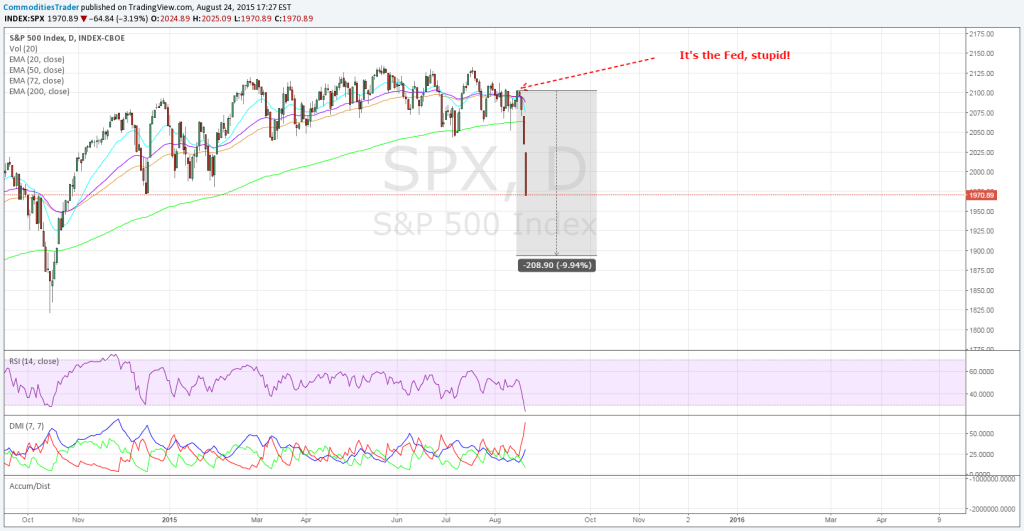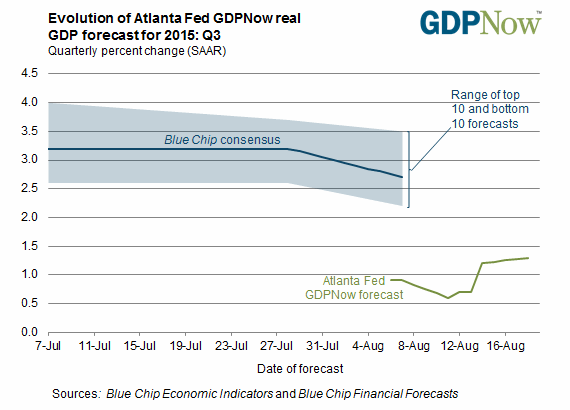As Black Monday comes to a close and complacency was once again slaughtered, financial media continues to get it wrong. The primary reason for the SPDR Dow Jones Industrial Average (NYSE:DIA) opening over 1,000 points lower is China and the meltdown seen in Chinese stocks, according to talking heads.
Needless to say, they forgot that the S&P 500 saw selling pressure well before the Shanghai Composite meltdown on Sunday evening.
Guests on various mainstream media outlets point the finger at China, and, potentially, at the fact that the People's Bank of China (PBoC) did not cut their RRR rate at all this weekend.
But lets take a step back for a moment. U.S. equities began to sell off last week - when China did not seem to matter - as soon as the leaked FOMC minutes indicated that members saw significant risks to U.S. growth and inflation. Supplemental data confirms that.
Inflation expectations have hit multi-year lows, and the Atlanta Fed's GDPNow gauge is tracking Q3 growth at a paltry 1.4 percent. That's less than half of the general consensus expect just a month ago.
Some of the best and brightest seem to become very disconnected with what is actually happening. Gemma Godfrey, Head of Investment Strategy at Brooks Macdonald, pointed out that what is unraveling needed to be put in context:
Unfortunately, it is an attempt to gloss over what is going on across the globe. China's growth has been a problem, which I have eluded to over the last year. Last week, the Chinese manufacturing PMI hit six year lows, while U.S. manufacturing PMI is inching closer to the pivotal 50 mark, which I forecasted would due to its correlation to lumber prices.
If you put into context the growth in the U.S., China and Europe it is dismal. This is the status quo during trillions of central bank stimulus. We're talking about slowing economic growth after a globalized stimulus of historic proportions. Let's put that into context.
The dollar dropped over two percent (session lows) not because of China. It dropped on the assumption that the Federal Reserve will not be able to raise interest rates and just may implement QE4. I expected the dollar index to begin with an 8-handle this summer, and that's fast approaching.
Since last September, I mentioned that any type of monetary tightening was a fallacy. The dollar was propped up on the assumption of a rate hike and was faith based. When that faith is challenged, the dollar would fall and fall hard. We are witnessing market participants realizing that central banks cannot prop risk assets forever.
The PBoC has cut rates several times, among numerous liquidity injections, and nothing is taking as the economy continues to slowdown.
After seven years of monetary policy accommodation - despite that contrarians said this a long time ago - it was deemed to add no real growth to the U.S. economy, according to both the St. Louis Fed and Bank of International Settlements.
Even Japan and Europe's attempt at quantitative easing has been dubbed a failure. Let's put that into context.
It is time to stop sugar-coating the obvious, but it is impossible because the of disconnect. And, then markets are in awe when NASDAQ Composite and S&P 500 futures limit down in early trading. (With nearly a decade of experience, I have not witnessed the S&P futures drop 120 points so effortlessly.)
Trading or investing is financial Darwinism. It is never the strongest or smartest that survive but the ones that can adapt to their environment; and Wall Street, and retail alike, is not adapting, and it's why they will be wiped out as they were in 2008/9.
In an outstanding interview on RealVision TV, Simon Mikhailovich, co-founder and managing partner at Tocqueville Bullion Reserve, went into what I feel further explains the "great disconnect."
"See nobody in the markets wants to ask the question. Just, today, people are looking - these rates are unsustainable, clearly the price of money is manipulated, and then they stop there. "Ok, oh that's the environment that will go on for a long time..." So, what if things change tomorrow, or not tomorrow, what if they change two, three years from now?"
"The mentality of these financial markets is what happens in the next three minutes... you're not going to retire tomorrow or the next 12 minutes. So, whether you make money tomorrow or for the next two months or next two years, or even for the next five years, what difference is it going to make when you loose it all and then some when prices return to their mean, equilibrium, historical equilibrium. Is that going to make you feel any better?"
Some made-for-television hedge fund-ers were on TV telling, the already scared retail investor, to jump back in because stocks are cheap!
The average Joe and Jane watched the S&P 500 loose over 10 percent in less than a week, and that is a reason to "buy the dip?" The S&P 500 is NOT cheap, and still boosts a price-to-earnings of 19.04 after the current shellacking. It is still higher now then it was when financial markets disintegrated in 2008.
These people, unfortunately, manage the wealth of others and remain so disconnected from the potential for disaster.
Investor Carl Ichan needs no introduction as his record clearly proceeds him. When he speaks, people listen. He has also been very vocal in the fact that stocks are overpriced and a correction is due.
Yet, frequent CNBC contributor and hedgie, David Seaburg, challenged Ichan. "Carl Icahn's call that the market is due for a pullback is absurd," said Seaburg on July 25.
He continued, "I definitely don't see any downside." Furthering the incompetence, "[in regards to the Dow Transports] I wouldn't look at this [divergence] as a negative indicator right now."
Well, back in March and April, I warned of growing divergences in the transports and the overall market. I said that the transports would see 8,100, which was spot on. The recent sell-off accelerated the index into bear market territory. In January, I also said the S&P 500 would see 1,810 by the end of 2015. That's not looking like an outlier anymore.
Mikhailovich said "the correlation in financial markets is as high as it's ever been in history. When it rains, it really potentially pours." He suggested that investors truly diversify their portfolio outside the conventional stocks, bonds, and real estate given historically high correlations.
Food for thought: If one bought at the top of the 2000 bubble and held until the 2015 top it would only be for a total gain of 38 percent. That's less than three percent a year.
We can always hope stocks are higher in 15-20 years from now; but when markets get halved every 6-7 years, it becomes a detriment to one's financial security.
Wealth is being destroy over the failure to adapt due to the bubbly egos of those whom "manage" wealth.


